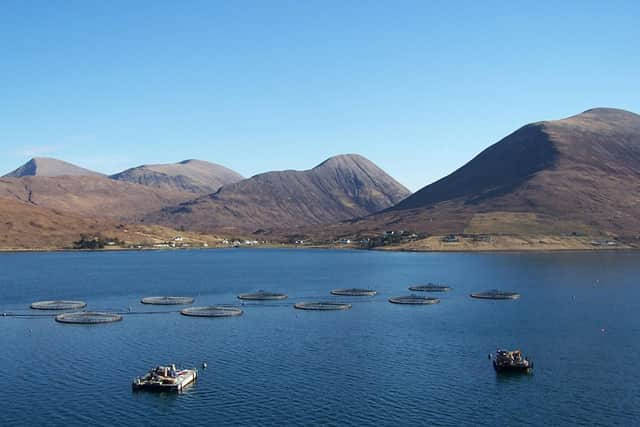Scottish salmon industry could grow faster if quangos got leaner - Tavish Scott
As many as 30,000 civil service jobs may go, growth in the economy is stalling says the independent Scottish Fiscal Commission, and spending will fall in cash and real terms across many areas.
Cuts in public expenditure which are envisaged by the government add to the worries that every family has over their household expenditure.
Advertisement
Hide AdAdvertisement
Hide AdA tank of petrol costing £100, travel chaos of families trying to get a summer break for the first time since Covid, and autumn heating bills set to go through the roof.
The picture is less than rosy. Scottish business faces higher rates bills and, meanwhile, the increases in the costs of government quangos and agencies are remorseless.
Those increases could be bearable if the performance and productivity of public sector administration was improving. Sadly, the opposite is the case.
All the more need then for Scotland’s enormous public sector to stop holding back the areas of our economy that can grow successfully and sustainably.


Businesses and sectors that can employ more people, pay more taxes and thus help public services, and feed not only our own country but the wider world.
Growing seafood in Scotland’s marine environment is part of a wider United Nations goal of more sustainable food for the ever-expanding world population. Aquaculture already provides more than half of the world’s seafood for human consumption.
The UN wants more salmon production because it has a lower carbon footprint that other edible protein sources - salmon produces less than 10 tonnes of CO2 per tonne of protein compared to poultry at 42 tonnes or pork at 58 tonnes.
Salmon grown in Scotland’s coastal waters is eaten here at home and abroad.
Advertisement
Hide AdAdvertisement
Hide AdOur sector has linked with Stirling Council to launch a salmon in schools initiative based on the nutritional benefits to young people.
Why? Because a recent nutritional analysis of Scottish salmon carried out by the University of Stirling has found that a single 140g portion is healthier than previously thought and provides more than 70 per cent of daily vitamin D needs.
In 50 countries across the globe, salmon from Scotland is an export success story for sustainable reasons.
We are the UK’s number one food export, yet Scotland’s share of the world salmon market is falling – down from 10 per cent of overall production less than a decade ago, to less than 7 per cent in 2022.
Increased competition from Norway, Iceland and Faroes mean we are in danger of falling further behind.
That fall also reflects the higher costs of regulation and bureaucracy in Scotland and the length of time government and quangos take to make a decision.
But there is a route forward.
The Scottish Government’s recently published blue economy proposals are a useful starting point. This covers all of seafood including shellfish, fishingand aquaculture.
Scottish ministers have been commendably clear in supporting the sustainable growth of the sector, which employs 10,000 people in growing salmon and the supply chain companies that underpin that success.
Advertisement
Hide AdAdvertisement
Hide AdMore than 200,000 tonnes of salmon - 850million healthy meals a year - are dispatched to households, restaurants and dinner tables around the world.
And it can be more because ,while government ministers have been supportive in their public statements, the system of government is slow, cumbersome and often simply will not make decisions.
The civil service and the myriad of government quangos in Scotland do not encourage business growth.
But they could. Kate Forbes has ordered 129 different government agencies to collaborate and become more efficient. Business supports that - it is long overdue.
But this welcome ministerial instruction feels like the 180 degrees turn in the wheel of the supertanker. What month will it happen, or rather what year?
In salmon farming, 30,000 tonnes of fish for Scotland and the world cannot be grown because of the bureaucracy that gets in the way.
Our sector looks not for less regulation, but better and more efficient approval of our plans given the red tape that means years pass before a salmon farm development is approved.
One Scottish farm has been waiting more than 500 days for a consent from the Scottish Government’s environmental regulator.
Advertisement
Hide AdAdvertisement
Hide AdThere are no less than four separate government bodies all with a remit to regulate the sector. They do not collaborate, they consult at different times with different inconsistent approaches and change position on a whim.
Evidence and scientific based policy making is something we just do not have.
Minister Mairi Gougeon commissioned an independent report into this bureaucracy, and Professor Russel Griggs published a sensible, constructive and admirably clear report in February.
He recommends that the public sector should get rid of the internal barriers it has created, co-operate and build a framework for regulation that enables businesses to grow, to employ more people, to pay more tax to government, and to build a stronger export industry for Scotland.
At times of economic hardship, of public sector cuts, of strikes on key public services, this is the time to drive reform, change and positive action.
Government ministers can lead with statements of intent and policy direction. But the much greater challenge for ministers is to change an administrative culture of indecision, inaction and inadequate performance.
That is the reality of public administration in Scotland today.
Only when that changes will the welcome rhetoric of ministers turn into a Scotland that enables business to proper.
-Tavis Scott is CEO of Salmon Scotland, the voice of Scotland’s farm-raised salmon sector
Comments
Want to join the conversation? Please or to comment on this article.
